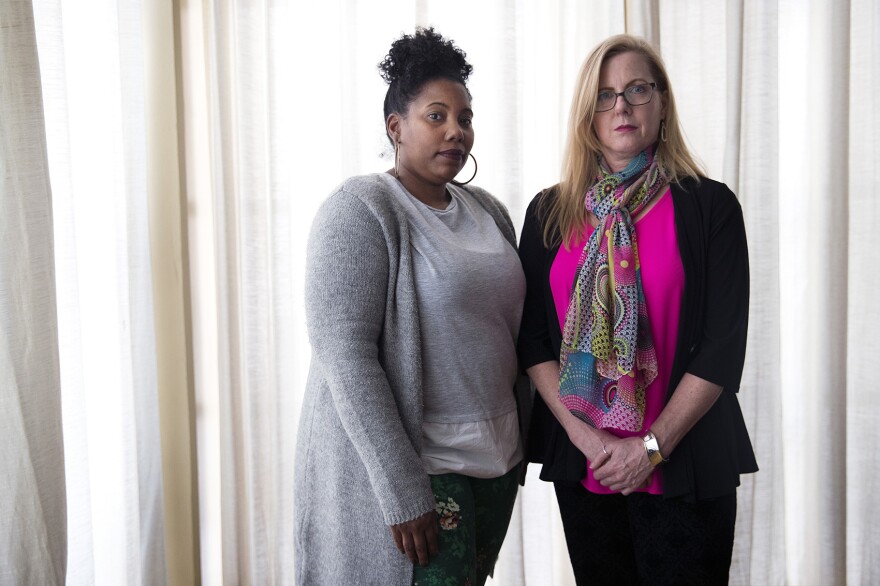What would you do if a Starbucks barista refused to give you the bathroom code? Or refused to give it to your black friend?
When this happened to two coworkers in Seattle, one was ready to let it slide.
But the other said, "No way." She confronted the barista, then sent a letter to Starbucks management claiming discrimination.
Starbucks will close 8,000 of its stores on May 29 for a staff training on racial bias following the arrest of a two black men at a cafe in Philadelphia. And the company also recently announced it will make its cafes and restrooms available to everyone — paying customer or not.
Shannon Harney and Gena Bacani hope their story can shed light on what else needs to change. Below are excerpts from their conversation with KUOW’s Liz Jones. Comments have been edited for length and clarity.
Gena: “It was on January 19th. I decided to take a break, so I walked with my coworker Maria down to our Starbucks on 4th and Seneca to get a cup of tea. When I go to a store I always read people's name tags. That day Dwight served me my cup of tea, and I was like, ‘Hi, Dwight!’ So I got a cup of tea, then texted Shannon after her meeting, and she came down to join us.
“I had to use the bathroom, so I went up and asked another barista for the bathroom code, and he was like, ‘You have to buy something.’ And I said, ‘I did buy something — I bought something from Dwight.’ Another customer gave me the code, because he wouldn’t give me the code. So then I walked back and I told them what happened.”
Shannon: “When Gena came back and told us what had happened, she was very upset. And I said, ‘I’m going to go talk to him.’ And she said, ‘No, no don’t. This stuff happens. Just let it go.’ And I said, ‘No that’s not right.’ I walked up to the barista, and I said, ‘May I have the code to the bathroom?’ And he said whatever the code was. And I said, ‘Do you always just give the code out? Because my friend came up here and asked for the code, and you told her she had to buy something.’ And he said, ‘Oh, I was just going to tell you that, too.’ I said, ‘But you didn’t. You gave me the code. Why?’
“My point was, why didn’t he ask me — a Caucasian woman — and why did he ask Gena, who’s African American and Filipino?”
Gena: “When Shannon went up there to get the code, she was only gone for like 15 seconds. And then she was back and she knew the code. I’m like, ‘What? He gave you the code right away? Why?’ He didn’t ask her if she purchased anything. It shows that she’s white and they’re not going to question her about what she’s doing or if she bought something to drink.”
Shannon: “Starbucks is a multi-billion-dollar corporation, and their stated mission is to inspire and nurture the human spirit one person, one cup and one neighborhood at a time. But we weren’t inspired. It was just a poor example of how to treat people in a downtown neighborhood. I don’t experience that where I live in the north end. There are not a lot of African American or Hispanic people in my community, and I don’t see that kind of bias with my other friends who are Caucasian. But I see it regularly with my African American friends. And it’s not right. It really angers me that there are so many people who are educated about so many thing, but something like this, there’s just silence.”
Gena: “My kids popped into my mind. This is what they’re going to go through. When we go places, I always remind them, we’ve got to buy something if you have to use the restroom. Let me buy this pack of gum so she can go use the restroom. And it’s not fair. It’s not fair for anyone.
It frustrates me because if you’re a parent and your child wants to use the bathroom, you have to buy something so they don’t have an accident. But it’s not just the bathroom. They think we’re all the same. All black people are not the same.”
Shannon: “Did my trying to prove a point with the barista make you feel worse?”
Gena: “It didn’t make me feel worse. I already knew you were going to get the code, and I knew he was going to treat you differently than me. Even though I was polite and nice to him and said, ‘Hi, how’s your afternoon going?’ I still wouldn’t be treated the way Shannon was treated.”
Shannon: “The fact is, it takes more to recognize your biases than just hearing about someone else’s. You really have to examine yourself and put yourself in that person’s shoes. Had I gone to ask for the code at Starbucks and been told I would have to buy something, I probably would have stood up for myself. But since Gena has had to endure this type of thing her whole life, she was willing to brush it under the carpet. To see that kind of racism and discrimination against her is painful. She does not deserve it. Nobody does.”
Gena: “I would love to walk a day in Shannon’s shoes, because she does get treated differently, versus me being a black woman who has to prove every day who I am — at work, anywhere. I’m always being questioned. There’s more for me to learn, to teach my children. I appreciate Shannon wanting to learn more. We can learn more together and maybe help the next person.”


